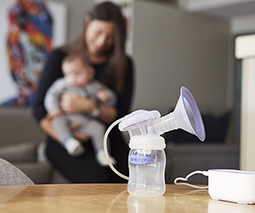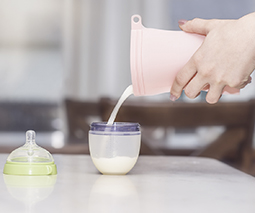“Breastfeeding is tough”: How stress can impact milk reaching your baby

Having a baby is a huge lifestyle change, and while it’s amazing, it also comes with its fair share of stress. Settling your baby and getting enough sleep, as well as coping with your changing hormone levels are all things that can make this special time stressful.
Breastfeeding is tough
Probably one of the most challenging parts of motherhood is breastfeeding, with many mums worrying about extra stress getting in the way of feeding their baby. Stress can affect breastfeeding in a few ways, for example by limiting the let-down reflex, which interferes with how much milk your baby can access. On the other hand, breastfeeding is associated with reducing stress because of the hormones that are released when milk starts flowing.
Stress isn’t always bad
Stress is a normal response we have to events that are perceived as dangerous and can be a helpful thing in getting us to take action. And when it comes to motherhood, there’s no escaping the inherent stress that comes with getting to know a new baby. There’s just so much to worry about! From making sure your baby is getting enough sleep to establishing breastfeeding, this is a time when stress levels can soar.
Read more about breastfeeding:
- Why the first six weeks of breastfeeding are the hardest
- I struggled to breastfeed my first baby – here’s what I plan to do differently
- This jaw-dropping illustration of breastfeeding boobs has got mums talking
Stress and breastfeeding isn’t always a disaster
It’s important to know that your milk production can still continue in times of stress. It won’t simply dry up, especially if you continue to feed often and on demand. The other thing to know is that breastfeeding can, in fact, help you reduce stress. Feeding your baby releases hormones such as oxytocin in your body, that promote feelings of relaxation and love.
But too much can have an impact
While brief stress responses can be beneficial, too much can affect the way you think and how your body works. When it comes to breastfeeding, stress can get in the way of how often you feed bub for, and how long at each time. During early breastfeeding, frequent feeds that are guided by baby’s demands are essential for setting up an abundant supply.
If you have a lot going on or feel stressed about looking after your baby, this can impact how you feed your baby. If you don’t feed often enough, or for long enough, your body might not receive the demand signals it needs to produce the right amount of milk for your baby.
In this way, stress can have an indirect effect on breastfeeding.

Stress and your let-down
Stress can have a more direct impact on how your milk reaches your baby. When your baby sucks at your breast, it triggers the let-down reflex, which is what makes your milk available to your baby. Stress can inhibit this release of milk, meaning your baby might remove less than usual. If this happens occasionally, it shouldn’t have too much impact overall on your breastmilk. However, if it happens repeatedly, your supply may be affected.
Coping with everyday stress
Motherhood is all about taking care of yourself so the normal stresses associated with having a baby don’t become too much of a problem. There’s no avoiding the challenging parts of motherhood, but it is possible to cope with stress so it all becomes much more manageable.
You can start by making self-care a priority, by ensuring you eat healthily and get plenty of fresh air. Enlist help from your support people so you can rest as often as possible. Delegate things that you find hard to keep up with, such as housework and cooking. Seek professional support if you’re unsure about how breastfeeding is going for you, or any other aspect of baby care.
Reaching out for help will help you beat the stress and give breastfeeding the best chance possible.









